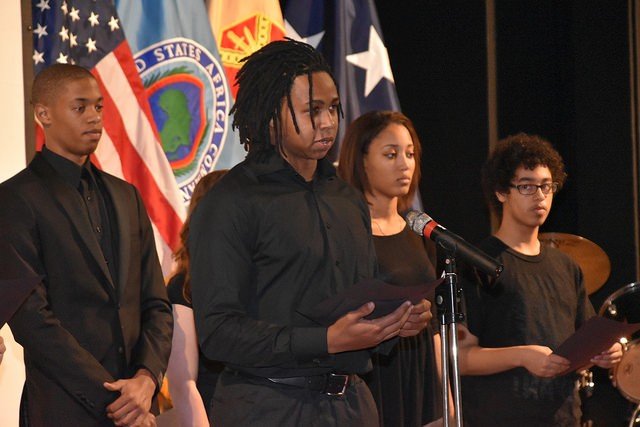
By Brenda Law
U.S. Africa Command Public Affairs
Every American knows know who Rosa Parks and Martin Luther King are. And some of these names may be familiar to you, too – Maya Angelou, Langston Hughes, Hattie McDaniel, Frederick Douglass. How about Carter G. Woodson, Nance Leggins-Costley, James Weldon Johnson, and Elizabeth Alexander?
If you’re having to Google any names, you’ve already listed one good reason why it’s important to know your history.
“People who have no record of what their forebears have accomplished lose the inspiration which comes from the teaching of biography and history.” – Carter G. Woodson cited as the father of black history in America.
“Hallowed Grounds – Sites of African American Memory” was the theme for this year’s celebration of Black History Month, hosted by U.S. Africa Command in partnership with the U.S. Army Garrison Stuttgart, Feb. 25.
Those memories were recalled and celebrated in a variety of film, song, jazz and poetry performances. If you weren’t part of the packed house at the Kelley Theater to see and hear it, you really missed out.
The Stuttgart High School Humanities Club delivered dramatic performances of works by African American poets, among them Langston Hughes’ A Dream Deferred and Maya Angelou’s Phenomenal Woman.
A foot-tapping and hand-clapping musical performance was on tap as well, courtesy of the energetic Patch Middle School Jazz Ensemble.
“This is such an important event to me,” said Mimi Butler, a speech language pathologist at Patch Middle School who had come to see the program, “and I’m so proud to see and hear our kids perform in this event to help us recall our history.”
As part of that history Carl Adams, a retired military officer and historian, said he became interested in the story of Nance Leggins-Costley about twenty years ago.
“Nance was the first slave freed by Abraham Lincoln,” said Adams, who gave a brief performance as Lincoln reflecting on the case of Nance, who, on her own initiative at age 13 began a legal battle to win her freedom, a battle that took her before the Illinois Supreme Court three times.
“Did you know that nearly 10,000 books have been written about Abraham Lincoln but not one about Nance,” declared Adams. “That’s when I decided to start digging further, because I realized it was just not right that this key piece of history be forgotten.” Adams spent years doing research and finally publish a book about Nance.
A dramatic reading from his book was performed by Tonya Holloway. Dramatization has long been a hallmark of passing history from one generation to the next, in words, poetry, music and song.
Spirituals and gospel music have always been a fundamental part of black history and this year’s celebration provided a moving performance by Christopher Mazen and Raquel Sargent singing a cappella, “Lord I Want to Be a Christian in My Heart” followed by a modern composition written by Orlando Palmer titled, “Fights For Me” that got the audience joining in to rock the house.
In a final performance piece, Maj. Shaalim David delivered a soliloquy on “Hallowed Grounds.“
“I honor those who have fought and perished in the line of duty for equal rights and freedoms,” said David, “those upon whose backs, America’s wealth was built. And those who were brutally murdered for the mere color of their skin, losing everything they knew and loved, and whose souls ache for justice.”
In what seemed to be as much a call to action as reflection, David went on the say, “After 245 years of slavery, racial discrimination and marginalization still exist today.”
History is what helps define who we are. Remembering history shines a light on our past and shows us how far we’ve come, and can serve as a call to action on how far we’ve yet to go.
For more event photos, click here.
